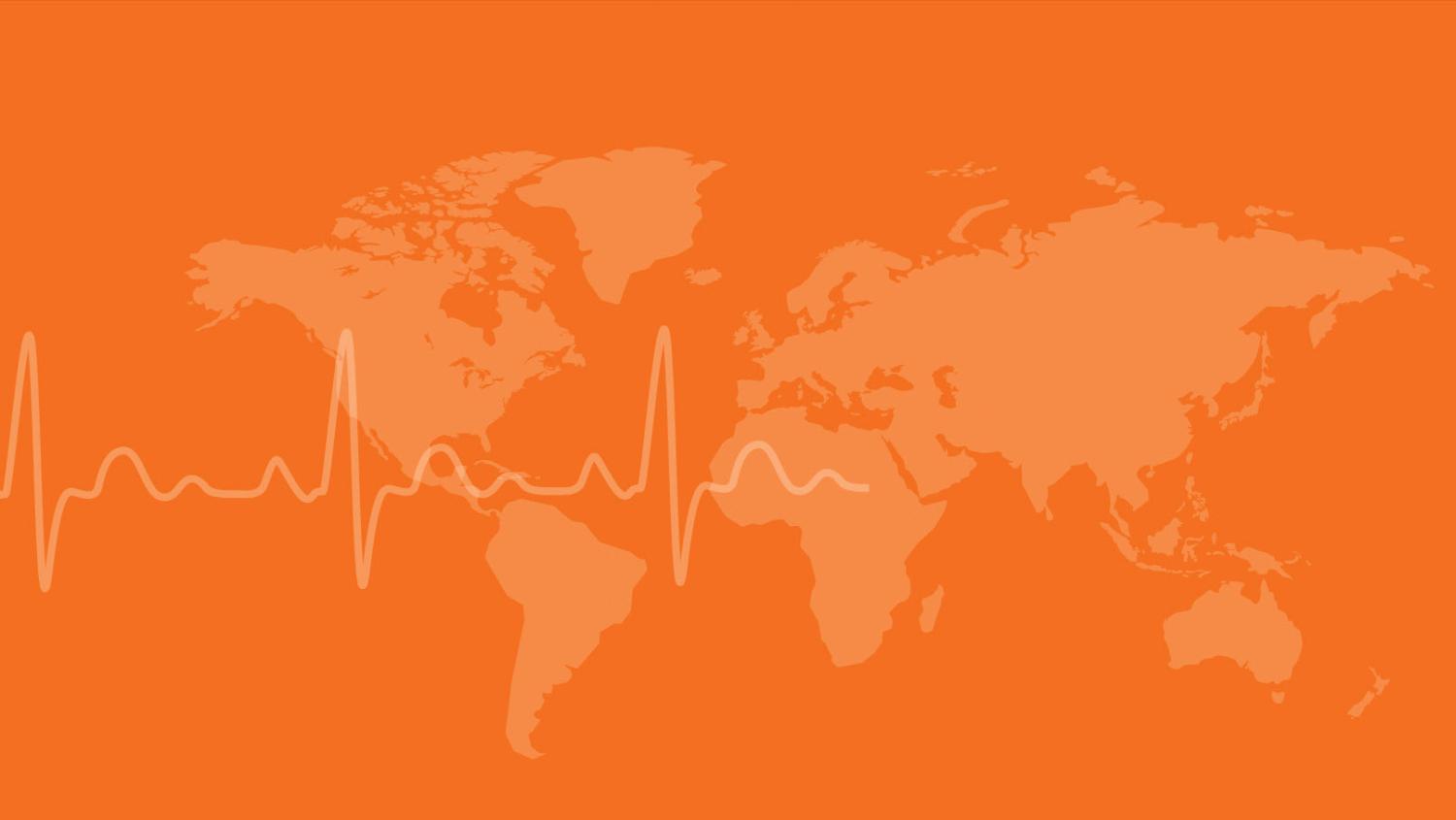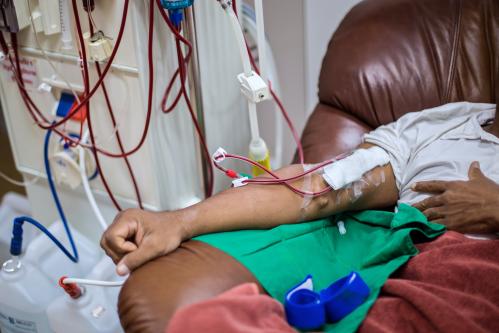- John Villasenor
- Jake Schneider
- See More
A new study published as part of the Brookings Private Sector Global Health R&D Project examines the capacity of selected low- and middle-income nations to make effective use of external investment in global health research & development. The study assesses overall health governance capacity of 18 nations in sub-Saharan Africa and Asia by examining 25 indicators related to the five dimensions of management capacity, regulatory processes, health infrastructure and financing, health systems, and policy conditions in those countries.
The interactive scorecard below provides each country’s overall score and performance across the five dimensions. Click on a country’s name to view detailed scoring information across all 25 indicators.
Health Governance Capacity Index (HGCI)
Vietnam
82%7080858095Close VietnamScore: 82%
Each indicator is scored on a scale from 1 (lowest) to 4 (highest). To learn more about the HGCI scores, please read the 2016 report.
Leadership and Management Capacity70%
Political Stability Index (percentile rank, scale 0-100)4/4
Transparency International Corruption Index Score (scale 0-100)3/4
Net Official Development Assistance (ODA) Received (% of GNI)2/4
Foreign Direct Investment, Net Inflows (% of GDP)3/4
External Resources (% of total health expenditure)2/4
Policies80%
Rule of Law (percentile rank, scale 0-100)4/4
Immunization Policies: % of the Population with DTP3 Vaccine4/4
Level of Tariffs on Medical Imports of Pharmaceutical Products3/4
Has Positive Intellectual Property Rights (Member to TRIPS Agreement)2/4
Free from Patent Restriction from GSK Manufactured Drugs3/4
Regulations85%
Regulatory Quality (percentile rank, scale 0-100)2/4
Business Climate (scale 0-100)4/4
Health Expenditure, Total (% of GDP)3/4
State Parties to the International Health Regulations4/4
Has Pharmaceutical Drug Regulatory Body4/4
Infrastructure and Financing80%
Overall Level of Statistical Capacity (scale 0-100)4/4
Access to Electricity (% of population)4/4
Out-Of-Pocket Expenditure (OOPS) (% of private health expenditure)2/4
Private Health Expenditure (% of total health expenditure)3/4
Private Insurance (% of private health expenditure)3/4
Health Systems95%
Nurses and Midwives (per 1,000 population)3/4
Physicians (per 1,000 population)4/4
Infant Mortality Rate (per 1,000 live births)4/4
Life Expectancy at Birth4/4
Population at Risk of Malaria (% of total population)4/4
South Africa
81%6570959085Close South AfricaScore: 81%
Each indicator is scored on a scale from 1 (lowest) to 4 (highest). To learn more about the HGCI scores, please read the 2016 report.
Leadership and Management Capacity65%
Political Stability Index (percentile rank, scale 0-100)4/4
Transparency International Corruption Index Score (scale 0-100)4/4
Net Official Development Assistance (ODA) Received (% of GNI)2/4
Foreign Direct Investment, Net Inflows (% of GDP)1/4
External Resources (% of total health expenditure)2/4
Policies70%
Rule of Law (percentile rank, scale 0-100)4/4
Immunization Policies: % of the Population with DTP3 Vaccine3/4
Level of Tariffs on Medical Imports of Pharmaceutical Products3/4
Has Positive Intellectual Property Rights (Member to TRIPS Agreement)2/4
Free from Patent Restriction from GSK Manufactured Drugs2/4
Regulations95%
Regulatory Quality (percentile rank, scale 0-100)4/4
Business Climate (scale 0-100)3/4
Health Expenditure, Total (% of GDP)4/4
State Parties to the International Health Regulations4/4
Has Pharmaceutical Drug Regulatory Body4/4
Infrastructure and Financing90%
Overall Level of Statistical Capacity (scale 0-100)4/4
Access to Electricity (% of population)3/4
Out-Of-Pocket Expenditure (OOPS) (% of private health expenditure)4/4
Private Health Expenditure (% of total health expenditure)3/4
Private Insurance (% of private health expenditure)4/4
Health Systems85%
Nurses and Midwives (per 1,000 population)4/4
Physicians (per 1,000 population)3/4
Infant Mortality Rate (per 1,000 live births)4/4
Life Expectancy at Birth2/4
Population at Risk of Malaria (% of total population)4/4
China
77%6070809085Close ChinaScore: 77%
Each indicator is scored on a scale from 1 (lowest) to 4 (highest). To learn more about the HGCI scores, please read the 2016 report.
Leadership and Management Capacity60%
Political Stability Index (percentile rank, scale 0-100)3/4
Transparency International Corruption Index Score (scale 0-100)4/4
Net Official Development Assistance (ODA) Received (% of GNI)1/4
Foreign Direct Investment, Net Inflows (% of GDP)3/4
External Resources (% of total health expenditure)1/4
Policies70%
Rule of Law (percentile rank, scale 0-100)3/4
Immunization Policies: % of the Population with DTP3 Vaccine4/4
Level of Tariffs on Medical Imports of Pharmaceutical Products3/4
Has Positive Intellectual Property Rights (Member to TRIPS Agreement)2/4
Free from Patent Restriction from GSK Manufactured Drugs2/4
Regulations80%
Regulatory Quality (percentile rank, scale 0-100)3/4
Business Climate (scale 0-100)4/4
Health Expenditure, Total (% of GDP)3/4
State Parties to the International Health Regulations2/4
Has Pharmaceutical Drug Regulatory Body4/4
Infrastructure and Financing90%
Overall Level of Statistical Capacity (scale 0-100)4/4
Access to Electricity (% of population)4/4
Out-Of-Pocket Expenditure (OOPS) (% of private health expenditure)3/4
Private Health Expenditure (% of total health expenditure)3/4
Private Insurance (% of private health expenditure)4/4
Health Systems85%
Nurses and Midwives (per 1,000 population)3/4
Physicians (per 1,000 population)4/4
Infant Mortality Rate (per 1,000 live births)2/4
Life Expectancy at Birth4/4
Population at Risk of Malaria (% of total population)4/4
Ghana
75%9080807055Close GhanaScore: 75%
Each indicator is scored on a scale from 1 (lowest) to 4 (highest). To learn more about the HGCI scores, please read the 2016 report.
Leadership and Management Capacity90%
Political Stability Index (percentile rank, scale 0-100)4/4
Transparency International Corruption Index Score (scale 0-100)4/4
Net Official Development Assistance (ODA) Received (% of GNI)3/4
Foreign Direct Investment, Net Inflows (% of GDP)4/4
External Resources (% of total health expenditure)3/4
Policies80%
Rule of Law (percentile rank, scale 0-100)4/4
Immunization Policies: % of the Population with DTP3 Vaccine3/4
Level of Tariffs on Medical Imports of Pharmaceutical Products4/4
Has Positive Intellectual Property Rights (Member to TRIPS Agreement)2/4
Free from Patent Restriction from GSK Manufactured Drugs3/4
Regulations80%
Regulatory Quality (percentile rank, scale 0-100)4/4
Business Climate (scale 0-100)3/4
Health Expenditure, Total (% of GDP)1/4
State Parties to the International Health Regulations4/4
Has Pharmaceutical Drug Regulatory Body4/4
Infrastructure and Financing70%
Overall Level of Statistical Capacity (scale 0-100)2/4
Access to Electricity (% of population)3/4
Out-Of-Pocket Expenditure (OOPS) (% of private health expenditure)3/4
Private Health Expenditure (% of total health expenditure)4/4
Private Insurance (% of private health expenditure)2/4
Health Systems55%
Nurses and Midwives (per 1,000 population)3/4
Physicians (per 1,000 population)2/4
Infant Mortality Rate (per 1,000 live births)3/4
Life Expectancy at Birth2/4
Population at Risk of Malaria (% of total population)1/4
Mozambique
72%8580757050Close MozambiqueScore: 72%
Each indicator is scored on a scale from 1 (lowest) to 4 (highest). To learn more about the HGCI scores, please read the 2016 report.
Leadership and Management Capacity85%
Political Stability Index (percentile rank, scale 0-100)3/4
Transparency International Corruption Index Score (scale 0-100)2/4
Net Official Development Assistance (ODA) Received (% of GNI)4/4
Foreign Direct Investment, Net Inflows (% of GDP)4/4
External Resources (% of total health expenditure)4/4
Policies80%
Rule of Law (percentile rank, scale 0-100)2/4
Immunization Policies: % of the Population with DTP3 Vaccine2/4
Level of Tariffs on Medical Imports of Pharmaceutical Products4/4
Has Positive Intellectual Property Rights (Member to TRIPS Agreement)4/4
Free from Patent Restriction from GSK Manufactured Drugs4/4
Regulations75%
Regulatory Quality (percentile rank, scale 0-100)2/4
Business Climate (scale 0-100)2/4
Health Expenditure, Total (% of GDP)3/4
State Parties to the International Health Regulations4/4
Has Pharmaceutical Drug Regulatory Body4/4
Infrastructure and Financing70%
Overall Level of Statistical Capacity (scale 0-100)2/4
Access to Electricity (% of population)2/4
Out-Of-Pocket Expenditure (OOPS) (% of private health expenditure)4/4
Private Health Expenditure (% of total health expenditure)4/4
Private Insurance (% of private health expenditure)2/4
Health Systems50%
Nurses and Midwives (per 1,000 population)2/4
Physicians (per 1,000 population)2/4
Infant Mortality Rate (per 1,000 live births)3/4
Life Expectancy at Birth1/4
Population at Risk of Malaria (% of total population)2/4
Tanzania
70%7090807040Close TanzaniaScore: 70%
Each indicator is scored on a scale from 1 (lowest) to 4 (highest). To learn more about the HGCI scores, please read the 2016 report.
Leadership and Management Capacity70%
Political Stability Index (percentile rank, scale 0-100)3/4
Transparency International Corruption Index Score (scale 0-100)2/4
Net Official Development Assistance (ODA) Received (% of GNI)3/4
Foreign Direct Investment, Net Inflows (% of GDP)3/4
External Resources (% of total health expenditure)3/4
Policies90%
Rule of Law (percentile rank, scale 0-100)3/4
Immunization Policies: % of the Population with DTP3 Vaccine4/4
Level of Tariffs on Medical Imports of Pharmaceutical Products3/4
Has Positive Intellectual Property Rights (Member to TRIPS Agreement)4/4
Free from Patent Restriction from GSK Manufactured Drugs4/4
Regulations80%
Regulatory Quality (percentile rank, scale 0-100)3/4
Business Climate (scale 0-100)2/4
Health Expenditure, Total (% of GDP)3/4
State Parties to the International Health Regulations4/4
Has Pharmaceutical Drug Regulatory Body4/4
Infrastructure and Financing70%
Overall Level of Statistical Capacity (scale 0-100)3/4
Access to Electricity (% of population)1/4
Out-Of-Pocket Expenditure (OOPS) (% of private health expenditure)4/4
Private Health Expenditure (% of total health expenditure)3/4
Private Insurance (% of private health expenditure)3/4
Health Systems40%
Nurses and Midwives (per 1,000 population)1/4
Physicians (per 1,000 population)1/4
Infant Mortality Rate (per 1,000 live births)2/4
Life Expectancy at Birth2/4
Population at Risk of Malaria (% of total population)2/4
Uganda
70%6085955060Close UgandaScore: 70%
Each indicator is scored on a scale from 1 (lowest) to 4 (highest). To learn more about the HGCI scores, please read the 2016 report.
Leadership and Management Capacity60%
Political Stability Index (percentile rank, scale 0-100)2/4
Transparency International Corruption Index Score (scale 0-100)1/4
Net Official Development Assistance (ODA) Received (% of GNI)3/4
Foreign Direct Investment, Net Inflows (% of GDP)3/4
External Resources (% of total health expenditure)3/4
Policies85%
Rule of Law (percentile rank, scale 0-100)3/4
Immunization Policies: % of the Population with DTP3 Vaccine3/4
Level of Tariffs on Medical Imports of Pharmaceutical Products3/4
Has Positive Intellectual Property Rights (Member to TRIPS Agreement)4/4
Free from Patent Restriction from GSK Manufactured Drugs4/4
Regulations95%
Regulatory Quality (percentile rank, scale 0-100)3/4
Business Climate (scale 0-100)4/4
Health Expenditure, Total (% of GDP)4/4
State Parties to the International Health Regulations4/4
Has Pharmaceutical Drug Regulatory Body4/4
Infrastructure and Financing50%
Overall Level of Statistical Capacity (scale 0-100)2/4
Access to Electricity (% of population)2/4
Out-Of-Pocket Expenditure (OOPS) (% of private health expenditure)3/4
Private Health Expenditure (% of total health expenditure)1/4
Private Insurance (% of private health expenditure)2/4
Health Systems60%
Nurses and Midwives (per 1,000 population)3/4
Physicians (per 1,000 population)2/4
Infant Mortality Rate (per 1,000 live births)3/4
Life Expectancy at Birth2/4
Population at Risk of Malaria (% of total population)2/4
Philippines
69%4560857085Close PhilippinesScore: 69%
Each indicator is scored on a scale from 1 (lowest) to 4 (highest). To learn more about the HGCI scores, please read the 2016 report.
Leadership and Management Capacity45%
Political Stability Index (percentile rank, scale 0-100)2/4
Transparency International Corruption Index Score (scale 0-100)3/4
Net Official Development Assistance (ODA) Received (% of GNI)1/4
Foreign Direct Investment, Net Inflows (% of GDP)2/4
External Resources (% of total health expenditure)1/4
Policies60%
Rule of Law (percentile rank, scale 0-100)3/4
Immunization Policies: % of the Population with DTP3 Vaccine1/4
Level of Tariffs on Medical Imports of Pharmaceutical Products3/4
Has Positive Intellectual Property Rights (Member to TRIPS Agreement)2/4
Free from Patent Restriction from GSK Manufactured Drugs3/4
Regulations85%
Regulatory Quality (percentile rank, scale 0-100)4/4
Business Climate (scale 0-100)3/4
Health Expenditure, Total (% of GDP)2/4
State Parties to the International Health Regulations4/4
Has Pharmaceutical Drug Regulatory Body4/4
Infrastructure and Financing70%
Overall Level of Statistical Capacity (scale 0-100)3/4
Access to Electricity (% of population)3/4
Out-Of-Pocket Expenditure (OOPS) (% of private health expenditure)2/4
Private Health Expenditure (% of total health expenditure)2/4
Private Insurance (% of private health expenditure)4/4
Health Systems85%
Nurses and Midwives (per 1,000 population)4/4
Physicians (per 1,000 population)4/4
Infant Mortality Rate (per 1,000 live births)3/4
Life Expectancy at Birth3/4
Population at Risk of Malaria (% of total population)3/4
Indonesia
68%5065807570Close IndonesiaScore: 68%
Each indicator is scored on a scale from 1 (lowest) to 4 (highest). To learn more about the HGCI scores, please read the 2016 report.
Leadership and Management Capacity50%
Political Stability Index (percentile rank, scale 0-100)3/4
Transparency International Corruption Index Score (scale 0-100)3/4
Net Official Development Assistance (ODA) Received (% of GNI)1/4
Foreign Direct Investment, Net Inflows (% of GDP)2/4
External Resources (% of total health expenditure)1/4
Policies65%
Rule of Law (percentile rank, scale 0-100)3/4
Immunization Policies: % of the Population with DTP3 Vaccine2/4
Level of Tariffs on Medical Imports of Pharmaceutical Products3/4
Has Positive Intellectual Property Rights (Member to TRIPS Agreement)2/4
Free from Patent Restriction from GSK Manufactured Drugs3/4
Regulations80%
Regulatory Quality (percentile rank, scale 0-100)4/4
Business Climate (scale 0-100)3/4
Health Expenditure, Total (% of GDP)1/4
State Parties to the International Health Regulations4/4
Has Pharmaceutical Drug Regulatory Body4/4
Infrastructure and Financing75%
Overall Level of Statistical Capacity (scale 0-100)4/4
Access to Electricity (% of population)4/4
Out-Of-Pocket Expenditure (OOPS) (% of private health expenditure)2/4
Private Health Expenditure (% of total health expenditure)3/4
Private Insurance (% of private health expenditure)2/4
Health Systems70%
Nurses and Midwives (per 1,000 population)3/4
Physicians (per 1,000 population)2/4
Infant Mortality Rate (per 1,000 live births)2/4
Life Expectancy at Birth4/4
Population at Risk of Malaria (% of total population)3/4
Kenya
68%5560907065Close KenyaScore: 68%
Each indicator is scored on a scale from 1 (lowest) to 4 (highest). To learn more about the HGCI scores, please read the 2016 report.
Leadership and Management Capacity55%
Political Stability Index (percentile rank, scale 0-100)2/4
Transparency International Corruption Index Score (scale 0-100)1/4
Net Official Development Assistance (ODA) Received (% of GNI)3/4
Foreign Direct Investment, Net Inflows (% of GDP)2/4
External Resources (% of total health expenditure)3/4
Policies60%
Rule of Law (percentile rank, scale 0-100)2/4
Immunization Policies: % of the Population with DTP3 Vaccine2/4
Level of Tariffs on Medical Imports of Pharmaceutical Products3/4
Has Positive Intellectual Property Rights (Member to TRIPS Agreement)2/4
Free from Patent Restriction from GSK Manufactured Drugs3/4
Regulations90%
Regulatory Quality (percentile rank, scale 0-100)3/4
Business Climate (scale 0-100)4/4
Health Expenditure, Total (% of GDP)3/4
State Parties to the International Health Regulations4/4
Has Pharmaceutical Drug Regulatory Body4/4
Infrastructure and Financing70%
Overall Level of Statistical Capacity (scale 0-100)1/4
Access to Electricity (% of population)2/4
Out-Of-Pocket Expenditure (OOPS) (% of private health expenditure)3/4
Private Health Expenditure (% of total health expenditure)4/4
Private Insurance (% of private health expenditure)4/4
Health Systems65%
Nurses and Midwives (per 1,000 population)2/4
Physicians (per 1,000 population)3/4
Infant Mortality Rate (per 1,000 live births)3/4
Life Expectancy at Birth2/4
Population at Risk of Malaria (% of total population)3/4
Liberia
66%9065705550Close LiberiaScore: 66%
Each indicator is scored on a scale from 1 (lowest) to 4 (highest). To learn more about the HGCI scores, please read the 2016 report.
Leadership and Management Capacity90%
Political Stability Index (percentile rank, scale 0-100)3/4
Transparency International Corruption Index Score (scale 0-100)3/4
Net Official Development Assistance (ODA) Received (% of GNI)4/4
Foreign Direct Investment, Net Inflows (% of GDP)4/4
External Resources (% of total health expenditure)4/4
Policies65%
Rule of Law (percentile rank, scale 0-100)1/4
Immunization Policies: % of the Population with DTP3 Vaccine1/4
Level of Tariffs on Medical Imports of Pharmaceutical Products3/4
Has Positive Intellectual Property Rights (Member to TRIPS Agreement)4/4
Free from Patent Restriction from GSK Manufactured Drugs4/4
Regulations70%
Regulatory Quality (percentile rank, scale 0-100)1/4
Business Climate (scale 0-100)1/4
Health Expenditure, Total (% of GDP)4/4
State Parties to the International Health Regulations4/4
Has Pharmaceutical Drug Regulatory Body4/4
Infrastructure and Financing55%
Overall Level of Statistical Capacity (scale 0-100)1/4
Access to Electricity (% of population)1/4
Out-Of-Pocket Expenditure (OOPS) (% of private health expenditure)4/4
Private Health Expenditure (% of total health expenditure)2/4
Private Insurance (% of private health expenditure)3/4
Health Systems50%
Nurses and Midwives (per 1,000 population)2/4
Physicians (per 1,000 population)1/4
Infant Mortality Rate (per 1,000 live births)4/4
Life Expectancy at Birth2/4
Population at Risk of Malaria (% of total population)1/4
Ethiopia
63%7080605550Close EthiopiaScore: 63%
Each indicator is scored on a scale from 1 (lowest) to 4 (highest). To learn more about the HGCI scores, please read the 2016 report.
Leadership and Management Capacity70%
Political Stability Index (percentile rank, scale 0-100)1/4
Transparency International Corruption Index Score (scale 0-100)3/4
Net Official Development Assistance (ODA) Received (% of GNI)3/4
Foreign Direct Investment, Net Inflows (% of GDP)3/4
External Resources (% of total health expenditure)4/4
Policies80%
Rule of Law (percentile rank, scale 0-100)2/4
Immunization Policies: % of the Population with DTP3 Vaccine4/4
Level of Tariffs on Medical Imports of Pharmaceutical Products2/4
Has Positive Intellectual Property Rights (Member to TRIPS Agreement)4/4
Free from Patent Restriction from GSK Manufactured Drugs4/4
Regulations60%
Regulatory Quality (percentile rank, scale 0-100)1/4
Business Climate (scale 0-100)1/4
Health Expenditure, Total (% of GDP)2/4
State Parties to the International Health Regulations4/4
Has Pharmaceutical Drug Regulatory Body4/4
Infrastructure and Financing55%
Overall Level of Statistical Capacity (scale 0-100)2/4
Access to Electricity (% of population)2/4
Out-Of-Pocket Expenditure (OOPS) (% of private health expenditure)2/4
Private Health Expenditure (% of total health expenditure)4/4
Private Insurance (% of private health expenditure)1/4
Health Systems50%
Nurses and Midwives (per 1,000 population)1/4
Physicians (per 1,000 population)1/4
Infant Mortality Rate (per 1,000 live births)2/4
Life Expectancy at Birth3/4
Population at Risk of Malaria (% of total population)3/4
India
61%5065705565Close IndiaScore: 61%
Each indicator is scored on a scale from 1 (lowest) to 4 (highest). To learn more about the HGCI scores, please read the 2016 report.
Leadership and Management Capacity50%
Political Stability Index (percentile rank, scale 0-100)2/4
Transparency International Corruption Index Score (scale 0-100)4/4
Net Official Development Assistance (ODA) Received (% of GNI)1/4
Foreign Direct Investment, Net Inflows (% of GDP)2/4
External Resources (% of total health expenditure)1/4
Policies65%
Rule of Law (percentile rank, scale 0-100)4/4
Immunization Policies: % of the Population with DTP3 Vaccine2/4
Level of Tariffs on Medical Imports of Pharmaceutical Products2/4
Has Positive Intellectual Property Rights (Member to TRIPS Agreement)2/4
Free from Patent Restriction from GSK Manufactured Drugs3/4
Regulations70%
Regulatory Quality (percentile rank, scale 0-100)3/4
Business Climate (scale 0-100)3/4
Health Expenditure, Total (% of GDP)2/4
State Parties to the International Health Regulations2/4
Has Pharmaceutical Drug Regulatory Body4/4
Infrastructure and Financing55%
Overall Level of Statistical Capacity (scale 0-100)3/4
Access to Electricity (% of population)3/4
Out-Of-Pocket Expenditure (OOPS) (% of private health expenditure)1/4
Private Health Expenditure (% of total health expenditure)2/4
Private Insurance (% of private health expenditure)2/4
Health Systems65%
Nurses and Midwives (per 1,000 population)4/4
Physicians (per 1,000 population)3/4
Infant Mortality Rate (per 1,000 live births)1/4
Life Expectancy at Birth3/4
Population at Risk of Malaria (% of total population)2/4
Sierra Leone
60%8565803040Close Sierra LeoneScore: 60%
Each indicator is scored on a scale from 1 (lowest) to 4 (highest). To learn more about the HGCI scores, please read the 2016 report.
Leadership and Management Capacity85%
Political Stability Index (percentile rank, scale 0-100)4/4
Transparency International Corruption Index Score (scale 0-100)2/4
Net Official Development Assistance (ODA) Received (% of GNI)4/4
Foreign Direct Investment, Net Inflows (% of GDP)4/4
External Resources (% of total health expenditure)3/4
Policies65%
Rule of Law (percentile rank, scale 0-100)1/4
Immunization Policies: % of the Population with DTP3 Vaccine2/4
Level of Tariffs on Medical Imports of Pharmaceutical Products2/4
Has Positive Intellectual Property Rights (Member to TRIPS Agreement)4/4
Free from Patent Restriction from GSK Manufactured Drugs4/4
Regulations80%
Regulatory Quality (percentile rank, scale 0-100)2/4
Business Climate (scale 0-100)2/4
Health Expenditure, Total (% of GDP)4/4
State Parties to the International Health Regulations4/4
Has Pharmaceutical Drug Regulatory Body4/4
Infrastructure and Financing30%
Overall Level of Statistical Capacity (scale 0-100)1/4
Access to Electricity (% of population)1/4
Out-Of-Pocket Expenditure (OOPS) (% of private health expenditure)2/4
Private Health Expenditure (% of total health expenditure)1/4
Private Insurance (% of private health expenditure)1/4
Health Systems40%
Nurses and Midwives (per 1,000 population)1/4
Physicians (per 1,000 population)1/4
Infant Mortality Rate (per 1,000 live births)4/4
Life Expectancy at Birth1/4
Population at Risk of Malaria (% of total population)1/4
Bangladesh
58%4575554570Close BangladeshScore: 58%
Each indicator is scored on a scale from 1 (lowest) to 4 (highest). To learn more about the HGCI scores, please read the 2016 report.
Leadership and Management Capacity45%
Political Stability Index (percentile rank, scale 0-100)2/4
Transparency International Corruption Index Score (scale 0-100)1/4
Net Official Development Assistance (ODA) Received (% of GNI)2/4
Foreign Direct Investment, Net Inflows (% of GDP)2/4
External Resources (% of total health expenditure)2/4
Policies75%
Rule of Law (percentile rank, scale 0-100)2/4
Immunization Policies: % of the Population with DTP3 Vaccine3/4
Level of Tariffs on Medical Imports of Pharmaceutical Products3/4
Has Positive Intellectual Property Rights (Member to TRIPS Agreement)4/4
Free from Patent Restriction from GSK Manufactured Drugs3/4
Regulations55%
Regulatory Quality (percentile rank, scale 0-100)1/4
Business Climate (scale 0-100)1/4
Health Expenditure, Total (% of GDP)1/4
State Parties to the International Health Regulations4/4
Has Pharmaceutical Drug Regulatory Body4/4
Infrastructure and Financing45%
Overall Level of Statistical Capacity (scale 0-100)3/4
Access to Electricity (% of population)3/4
Out-Of-Pocket Expenditure (OOPS) (% of private health expenditure)1/4
Private Health Expenditure (% of total health expenditure)1/4
Private Insurance (% of private health expenditure)1/4
Health Systems70%
Nurses and Midwives (per 1,000 population)1/4
Physicians (per 1,000 population)3/4
Infant Mortality Rate (per 1,000 live births)2/4
Life Expectancy at Birth4/4
Population at Risk of Malaria (% of total population)4/4
Congo (DR)
54%5565605040Close Congo (DR)Score: 54%
Each indicator is scored on a scale from 1 (lowest) to 4 (highest). To learn more about the HGCI scores, please read the 2016 report.
Leadership and Management Capacity55%
Political Stability Index (percentile rank, scale 0-100)1/4
Transparency International Corruption Index Score (scale 0-100)1/4
Net Official Development Assistance (ODA) Received (% of GNI)4/4
Foreign Direct Investment, Net Inflows (% of GDP)1/4
External Resources (% of total health expenditure)4/4
Policies65%
Rule of Law (percentile rank, scale 0-100)1/4
Immunization Policies: % of the Population with DTP3 Vaccine3/4
Level of Tariffs on Medical Imports of Pharmaceutical Products1/4
Has Positive Intellectual Property Rights (Member to TRIPS Agreement)4/4
Free from Patent Restriction from GSK Manufactured Drugs4/4
Regulations60%
Regulatory Quality (percentile rank, scale 0-100)1/4
Business Climate (scale 0-100)1/4
Health Expenditure, Total (% of GDP)2/4
State Parties to the International Health Regulations4/4
Has Pharmaceutical Drug Regulatory Body4/4
Infrastructure and Financing50%
Overall Level of Statistical Capacity (scale 0-100)1/4
Access to Electricity (% of population)1/4
Out-Of-Pocket Expenditure (OOPS) (% of private health expenditure)3/4
Private Health Expenditure (% of total health expenditure)2/4
Private Insurance (% of private health expenditure)3/4
Health Systems40%
Nurses and Midwives (per 1,000 population)2/4
Physicians (per 1,000 population)2/4
Infant Mortality Rate (per 1,000 live births)1/4
Life Expectancy at Birth1/4
Population at Risk of Malaria (% of total population)2/4
Pakistan
54%4045655565Close PakistanScore: 54%
Each indicator is scored on a scale from 1 (lowest) to 4 (highest). To learn more about the HGCI scores, please read the 2016 report.
Leadership and Management Capacity40%
Political Stability Index (percentile rank, scale 0-100)1/4
Transparency International Corruption Index Score (scale 0-100)2/4
Net Official Development Assistance (ODA) Received (% of GNI)2/4
Foreign Direct Investment, Net Inflows (% of GDP)1/4
External Resources (% of total health expenditure)2/4
Policies45%
Rule of Law (percentile rank, scale 0-100)2/4
Immunization Policies: % of the Population with DTP3 Vaccine1/4
Level of Tariffs on Medical Imports of Pharmaceutical Products1/4
Has Positive Intellectual Property Rights (Member to TRIPS Agreement)2/4
Free from Patent Restriction from GSK Manufactured Drugs3/4
Regulations65%
Regulatory Quality (percentile rank, scale 0-100)2/4
Business Climate (scale 0-100)2/4
Health Expenditure, Total (% of GDP)1/4
State Parties to the International Health Regulations4/4
Has Pharmaceutical Drug Regulatory Body4/4
Infrastructure and Financing55%
Overall Level of Statistical Capacity (scale 0-100)3/4
Access to Electricity (% of population)4/4
Out-Of-Pocket Expenditure (OOPS) (% of private health expenditure)1/4
Private Health Expenditure (% of total health expenditure)2/4
Private Insurance (% of private health expenditure)1/4
Health Systems65%
Nurses and Midwives (per 1,000 population)2/4
Physicians (per 1,000 population)4/4
Infant Mortality Rate (per 1,000 live births)1/4
Life Expectancy at Birth3/4
Population at Risk of Malaria (% of total population)3/4
Nigeria
52%4055704550Close NigeriaScore: 52%
Each indicator is scored on a scale from 1 (lowest) to 4 (highest). To learn more about the HGCI scores, please read the 2016 report.
Leadership and Management Capacity40%
Political Stability Index (percentile rank, scale 0-100)1/4
Transparency International Corruption Index Score (scale 0-100)2/4
Net Official Development Assistance (ODA) Received (% of GNI)2/4
Foreign Direct Investment, Net Inflows (% of GDP)1/4
External Resources (% of total health expenditure)2/4
Policies55%
Rule of Law (percentile rank, scale 0-100)1/4
Immunization Policies: % of the Population with DTP3 Vaccine1/4
Level of Tariffs on Medical Imports of Pharmaceutical Products4/4
Has Positive Intellectual Property Rights (Member to TRIPS Agreement)2/4
Free from Patent Restriction from GSK Manufactured Drugs3/4
Regulations70%
Regulatory Quality (percentile rank, scale 0-100)2/4
Business Climate (scale 0-100)2/4
Health Expenditure, Total (% of GDP)2/4
State Parties to the International Health Regulations4/4
Has Pharmaceutical Drug Regulatory Body4/4
Infrastructure and Financing45%
Overall Level of Statistical Capacity (scale 0-100)2/4
Access to Electricity (% of population)2/4
Out-Of-Pocket Expenditure (OOPS) (% of private health expenditure)1/4
Private Health Expenditure (% of total health expenditure)1/4
Private Insurance (% of private health expenditure)3/4
Health Systems50%
Nurses and Midwives (per 1,000 population)4/4
Physicians (per 1,000 population)3/4
Infant Mortality Rate (per 1,000 live births)1/4
Life Expectancy at Birth1/4
Population at Risk of Malaria (% of total population)1/4
About the study
Efforts to increase investment in global health traditionally focus on national governments and publicly funded multilateral aid organizations. Although the public sector is essential to the financing of medical research and development, non-governmental contributions have a large role to play as well. Given the proper environment—one in which it is clear that healthcare innovations will pass regulatory, policy, and legal muster—private sector financing can be a key source of investment in new medical treatments and preventions.
In “Health Governance Capacity: Enhancing Private Sector Investment in Global Health,” authors Darrell West, John Villasenor, and Jake Schneider examine the capacity of certain low- and middle-income nations to make effective use of external investment in global health R&D. “Good governance is a foundational condition for global health investment,” the authors write. “It conditions the overall environment in which both public and private sector health investment takes place.”
The researchers assess the overall health governance capacity of 18 nations in sub-Saharan Africa and Asia by examining 25 indicators related to the management capacity, regulatory processes, health infrastructure and financing, health systems, and policy conditions in those countries. Their key findings include:
- Of the 18 countries studied, Vietnam, South Africa, China, and Ghana rank highest on the authors’ Health Governance Capacity Index (HGCI), indicating that these nations have a strong ability to attract and leverage private investment in health R&D.
- Bangladesh, the Democratic Republic of the Congo, Pakistan, and Nigeria rank lowest on the HGCI. These nations received low scores on the dimensions of “Management Capacity” and “Health Systems,” indicating that targeted efforts to improve those areas could have a significant impact on their ability to absorb new investments relevant to global health goals.
- In general, low- and middle-income countries can attract greater private investment in health R&D by increasing government transparency and stability, lowering tariffs on medical products, expediting the regulatory process for new drugs, investing in health infrastructure, and increasing government spending on health care in an efficient and targeted manner.
“By boosting private investment in global health R&D, the world can achieve even more impressive gains in personal well-being and economic growth,” the authors conclude in this, the first in a series of planned publications under the Brookings Private Sector Global Health R&D Project.
For more information, download the full report. Comments and feedback can be sent to [email protected].
Authors


The Brookings Institution is committed to quality, independence, and impact.
We are supported by a diverse array of funders. In line with our values and policies, each Brookings publication represents the sole views of its author(s).




